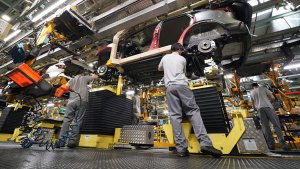Despite predictions of job losses, automation technology is creating a more exciting future for thousands of employees.
Robotic Process Automation Transforms Human Productivity
Despite predictions of job losses, automation technology is creating a more exciting future for thousands of employees.

As robotic process automation (RPA) technology demonstrates its worth, almost every workplace with administrative functions will benefit.
Accounting and consultancy firm PwC last year (2017) estimated that about 30 per cent of UK jobs could be affected by automation by the early 2030s (lower than the US at 38 per cent and Germany at 35 per cent, but higher than Japan at 21 per cent).
PwC predicts that automation will be more common in sectors such as transport, manufacturing, wholesale and retail, and lower in education, health and social work.
While it is true that workers will need to adapt to robot technology, the reality is that occupations will not disappear but evolve alongside “increasingly capable” machines. These will be driven by the technology known as robotic process automation (RPA).
What is RPA?
RPA deploys software robots that mimic human actions within repetitive task-based work processes, such as processing a customer’s insurance claim or transaction.
The difference is that tasks which would take a human several hours are completed in minutes. Software robots do not sleep and never take a day off.
The productivity and accuracy gains are immense, which is why RPA is already used to automate back-office business tasks in finance, HR, marketing and sales.
It is a technology that plugs into existing business or CRM systems, can harvest data from public sources over the internet and does not require the replacement of IT infrastructure.
If RPA is combined with artificial intelligence (AI), acquiring problem-solving capabilities, it can be employed for a multitude of more complex tasks, including customer service.
As implementations increase, many businesses will find the greatest productivity gains are derived from the combination of human supervision, automation and AI.
Since software robots can work autonomously or under the supervision of a member of staff, the best outcomes are likely to be delivered when the majority of employees have their own robot to free them of drudge-work.
These robots may use AI, but operate under the light-touch supervision of a member-of-staff.
The benefits of RPA
RPA enables companies to achieve multi-factor efficiency gains and to cut costs by performing administrative tasks far quicker, with fewer errors and more cheaply than with old manual methods.
It is already understood that a software robot costs three times less than an offshore worker. A South Africa-based insurance company, for instance, is using RPA to coordinate cognitive technologies and document capture tools, completely automating the processing of 1.5 million emails each year.
The implementation has lowered its cost-per-transaction by 91 per cent compared with the previous manual procedures.
The gains are not only to be measured in cost-reduction, however.
If workers do less dull and repetitive administrative work, they are free to tackle more interesting and ultimately more productive tasks such as analysing business trends, devising strategies or using their creative and interpersonal skills with customers in roles that robots are unlikely ever to fulfil.
Predictions of mass redundancies have not been fulfilled.
In customer service, RPA gives managers better information on which to base decisions and helps companies comply with the time-consuming task of complying with regulations, no matter how complex.
RPA is on the march among forward-looking businesses
It is a technology that is advancing rapidly. Nearly half (49 per cent) of businesses surveyed in 2017, said that they hoped to use RPA within the next year. Early adopters included Walmart, Deutsche Bank, AT&T, and American Express.
Deloitte, the accounting firm and consultancy, says wealth-management firms are using automation technology to review and analyse investment portfolio data.
Global banks, on the other hand, are using it to monitor all electronic communications of employees for indicators of activities that may contravene regulations.
As RPA becomes better understood, many more companies will realise they must use it to streamline administrative tasks.
Robot says yes: tips for smart automation
Implementing RPA does not require a special approach. Companies should use the same steps and criteria they use when evaluating other new technologies.
Deloitte’s advice is that organisations should review their operations to reveal those areas where automation could bring improvements and efficiencies.
Then they should develop a business case for automation technology, identifying suppliers to work with, following which they should plan a schedule for introducing the technology. This can all happen in weeks, rather than months or years.
Throughout the process, it is important that IT departments are brought on board, because RPA requires collaboration from all teams. IT has a crucial role to play in helping the business realise the many financial, and non-financial, benefits of automation.
RPA may be a business-driven programme of transformation, but it needs to be governed by IT.
RPA implementors must also have a solid track record of delivery which have been demonstrably effective and worked at scale.
It is important that organisations take care in their choice of supplier since the potentially very substantial returns on investment can be undermined by automation that fails to integrate with existing systems or which is poorly mapped onto work procedures.
In less than a year most organisations have already achieved positive return on investment, but effective implementation requires expertise and experience.
RPA is already delivering big gains for all kinds of businesses without the mass redundancies forecast in headlines. It promises a more productive and creative future for employees right across the business world.
Guy Kirkwood is chief evangelist at UiPath.
Thanks for signing up to Minutehack alerts.
Brilliant editorials heading your way soon.
Okay, Thanks!

